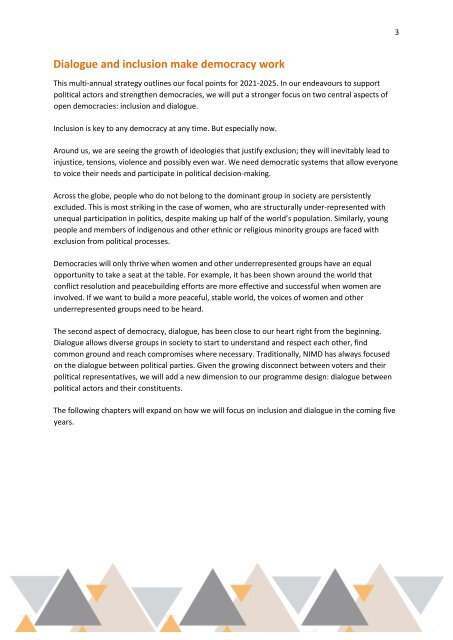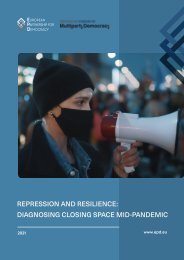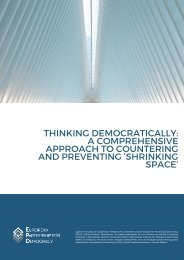NIMD Multi-Annual Strategy 2021-25
Create successful ePaper yourself
Turn your PDF publications into a flip-book with our unique Google optimized e-Paper software.
3<br />
Dialogue and inclusion make democracy work<br />
This multi-annual strategy outlines our focal points for <strong>2021</strong>-20<strong>25</strong>. In our endeavours to support<br />
political actors and strengthen democracies, we will put a stronger focus on two central aspects of<br />
open democracies: inclusion and dialogue.<br />
Inclusion is key to any democracy at any time. But especially now.<br />
Around us, we are seeing the growth of ideologies that justify exclusion; they will inevitably lead to<br />
injustice, tensions, violence and possibly even war. We need democratic systems that allow everyone<br />
to voice their needs and participate in political decision-making.<br />
Across the globe, people who do not belong to the dominant group in society are persistently<br />
excluded. This is most striking in the case of women, who are structurally under-represented with<br />
unequal participation in politics, despite making up half of the world’s population. Similarly, young<br />
people and members of indigenous and other ethnic or religious minority groups are faced with<br />
exclusion from political processes.<br />
Democracies will only thrive when women and other underrepresented groups have an equal<br />
opportunity to take a seat at the table. For example, it has been shown around the world that<br />
conflict resolution and peacebuilding efforts are more effective and successful when women are<br />
involved. If we want to build a more peaceful, stable world, the voices of women and other<br />
underrepresented groups need to be heard.<br />
The second aspect of democracy, dialogue, has been close to our heart right from the beginning.<br />
Dialogue allows diverse groups in society to start to understand and respect each other, find<br />
common ground and reach compromises where necessary. Traditionally, <strong>NIMD</strong> has always focused<br />
on the dialogue between political parties. Given the growing disconnect between voters and their<br />
political representatives, we will add a new dimension to our programme design: dialogue between<br />
political actors and their constituents.<br />
The following chapters will expand on how we will focus on inclusion and dialogue in the coming five<br />
years.

















